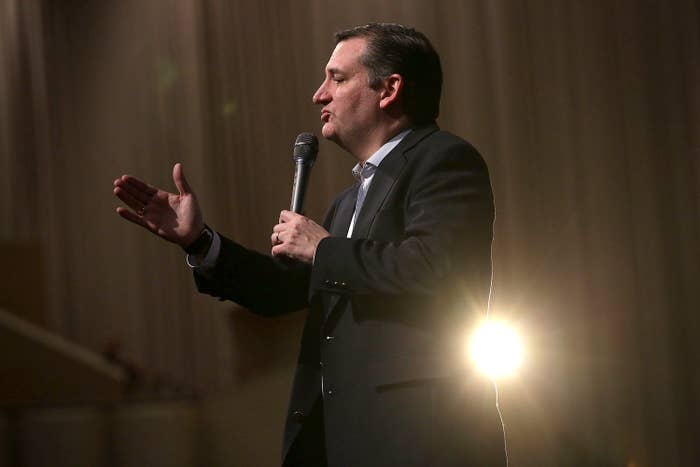
GREENVILLE, S.C. — Justice Antonin Scalia's sudden death Saturday will intensify an already contentious presidential election, in which candidates have spent months campaigning on promises to remake the Supreme Court in their respective ideological images, reshape American jurisprudence for a generation — and, consequently, tip the scales in some of the defining national debates of our time.
While the immediate political debate surrounding Scalia's death has focused on the question of who should get to appoint the conservative judicial icon's replacement — President Obama, or his Oval Office successor — the fate of the Supreme Court has been a major theme in the messages of 2016 contenders from Ted Cruz to Hillary Clinton.
Clinton regularly warns voters that the next president could appoint as many as three justices to the bench, meaning the ideological makeup of the court — and high-stakes issues like voting rights and abortion — hang in the balance. To make those appointments, she said last week, she will use "a bunch of litmus tests."
"I'm looking for people who understand the way the real world works,” Clinton said said at a forum in New Hampshire. “Who don’t have a knee-jerk reaction to support business, to support the idea that you know, money is speech, that gutted the Voting Rights Act. ... We have to preserve marriage equality. We have to go further to end discrimination against the LGBT community, we’ve got to make sure to preserve Roe v. Wade, not let it be nibbled away or repealed.”
"It's one of the many reasons why we can't turn the White House over to Republicans," she added.
Cruz, a former federal litigator and Constitutional lawyer, has made influencing the future of the Supreme Court a central selling point for his candidacy, promising voters he will "spend whatever political capital is necessary" to ensure the bench is packed with conservatives.
In recent speeches and interviews, Cruz has painted a dystopian picture of the country's fate if a Democratic president gets to stack the Supreme Court: Crosses and Stars of David will be chiseled off the tombstones of fallen soldiers. Ten Commandments monuments will be carted out of government buildings. "On-demand" abortion will be universally available to teenagers without parental consent.
"We are one liberal justice away from a five-justice liberal majority, the likes of which this country has never seen," Cruz said Friday in a talk radio interview. The same day, he warned evangelicals at Bob Jones University, "We get this election wrong, and our constitutional rights will be lost for a generation."
With Scalia's seat now vacant, the prospect of a transformed Supreme Court is much less abstract. Unless the seat is filled with another dynamic conservative and champion of originalism, the result will be a meaningful, long-term ideological shift in the court — and which direction it shifts may well depend on who is elected in November.
Those stakes will undoubtedly shape the debate currently consuming both parties' presidential primaries over which trait is most important in a candidate: "electability" or ideological purity.
One candidate likely to come under increased fire over both questions is Donald Trump. Last August, shortly after he announced his candidacy, Trump said his sister — a liberal, pro-choice appellate judge — "would be phenomenal" in the Supreme Court, a comment that riled many social conservatives. Trump's rhetoric has moved closer to the Republican mainstream recently, though he still doesn't speak with much command on the issue. In an interview with Boston Public Radio the day before the New Hampshire primary, he described his criteria for judicial appointments.
“I’m pro-life, and I would put in pro-life,” he said. “We want many different qualifications, we want a high degree of intelligence, that’s a very important qualification. You look at some of these decisions that are coming down now from some of these people, and it’s terrible what’s going on.”
In the Democratic race, questions about the ability of ascendant socialist Bernie Sanders to win in a general election will become more consequential.
While Sanders has long delighted supporters with his talk of using the Supreme Court to take power away from plutocrats and revolutionize the American political system — a central theme of his campaign — his rhetoric has also raised eyebrows among some progressives, who worry about his apparent unfamiliarity with the mechanics of the judicial system.
In January, Sanders tweeted, "Billionaires already own much of our economy. That, apparently, is not enough. Now, they want to own the United States government as well. Any Supreme Court nominee of mine will make overturning Citizens United one of their first decisions."
As several observers noted, Supreme Court justices, unlike legislators, don't get to decide which issues they will tackle first — they must wait for relevant cases to wind their way through the courts. A spokesperson for the candidate chalked up the error to the Tweet being "worded oddly." But it led some to question Sanders's understanding — and commitment — to the Supreme Court.
"The fact that no one in his campaign caught a fairly rudimentary error in his Citizens United tweet ... does suggest that he is currently not making the judiciary a high priority," wrote Ian Millhiser at the liberal site ThinkProgress. "It also suggests that his priorities may not align with the actual leverage points that will be available to him if he becomes president."
